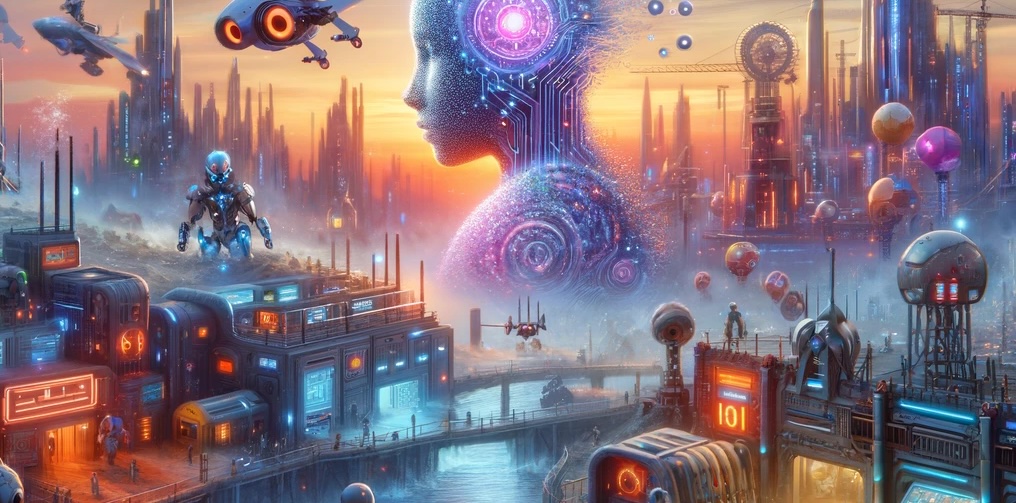The intersection of gaming and Artificial Intelligence (AI) is creating a paradigm shift in the entertainment industry, promising to redefine the future of gaming. AI’s rapid evolution is not only enhancing game design and playability but also transforming how games are developed, marketed, and experienced. This blog post delves into the future of gaming within the AI industry, exploring the innovations and trends that are shaping this dynamic landscape.
AI-Driven Game Development
Procedural Content Generation (PCG)
- Overview: AI algorithms can automatically generate game content, from landscapes and levels to characters and storylines, making each player’s game experience unique.
- Impact: PCG allows for more expansive and diverse gaming worlds, reducing the time and resources needed for content creation.
Dynamic Difficulty Adjustment (DDA)
- Overview: AI can analyze a player’s skill level and adjust the game’s difficulty in real-time, ensuring a challenging yet achievable experience.
- Impact: DDA enhances player engagement and retention by providing a personalized gaming experience that caters to different skill levels.
AI in Gameplay and Interaction
Non-Player Characters (NPCs) and AI Opponents
- Overview: AI is used to create more intelligent and adaptable NPCs, offering players more realistic and challenging interactions.
- Impact: Advanced AI in NPCs enhances the storytelling and strategic depth of games, offering a more immersive and engaging experience.
Voice and Gesture Recognition
- Overview: Integrating AI with voice and gesture recognition technologies allows for more natural and intuitive player interactions.
- Impact: This integration paves the way for innovative gameplay mechanics and control schemes, broadening the accessibility and appeal of games.
Personalization and Learning
Adaptive Learning Systems
- Overview: AI can analyze player behavior and preferences to tailor game experiences, recommend content, and predict future trends.
- Impact: This personalization increases player satisfaction and loyalty, allowing developers to create more targeted and successful games.
The Role of AI in Game Testing and Quality Assurance
- Overview: AI can automate the testing process, identifying bugs and balance issues more efficiently than traditional methods.
- Impact: Improved quality assurance leads to more polished and enjoyable games, enhancing the overall player experience.
- AI plays a crucial role in several aspects of game development, enhancing the overall experience and immersion. Here are some areas where AI is particularly critical in helping game developers:
- NPC Behavior: AI is essential for controlling the behavior of non-player characters (NPCs), making them respond realistically to player actions and the game environment. This includes enemies adapting tactics, allies providing support, and civilians reacting to the in-game world.
- Procedural Content Generation: AI helps in creating vast, dynamic worlds by procedurally generating environments, levels, and scenarios, allowing for unique experiences in each gameplay session.
- Game Balancing: AI analyzes player data to adjust the difficulty levels dynamically, ensuring that the game remains challenging yet fair, and tailoring the experience to different types of players.
- Player Modeling: AI tracks player behavior and preferences to model player types, which can then be used to customize game experiences, recommend content, or adapt game narratives.
- Decision Making and Strategy: In strategy games, AI controls opponent factions or units, making strategic decisions that challenge the player and create a more engaging game experience.
- Animation and Motion: AI-driven procedural animation and motion capture can create more realistic and fluid movements for characters and creatures, enhancing visual realism.
- Testing and Quality Assurance: AI automates the testing process, identifying bugs and glitches more efficiently by simulating a wide range of in-game actions and scenarios.
- Storytelling and Narrative: AI can dynamically alter game narratives based on player choices, leading to branching storylines and multiple endings, which increases the replayability of the game.
- Voice Recognition and Interaction: In some games, AI is used to interpret voice commands or engage in conversations with the player, providing a more interactive and immersive experience.
- Facial Recognition and Emotion Simulation: AI-driven facial recognition can be used to create more expressive and emotionally responsive characters, which can enhance storytelling and player connection with the game.
Ethical Considerations and Player Privacy
- Overview: As AI becomes more integrated into gaming, issues related to data privacy, ethical AI use, and player surveillance emerge.
- Impact: The industry must address these concerns to ensure trust and safety for players, balancing innovation with responsible AI practices.
Future Trends and Predictions
- Immersive AI-driven Worlds: Future games might offer fully dynamic and evolving worlds powered by AI, where player actions have real-time, lasting impacts on the game environment.
- AI as a Creative Partner: Game developers might collaborate more closely with AI in the creative process, using it as a tool to enhance creativity rather than just a means to an end.
- Enhanced Social Interactions: AI could facilitate more meaningful social interactions in multiplayer games, creating communities and shared experiences that mirror real-life complexity.
- Here are the key ways AI is influencing the future of Game Development
- Advanced AI-driven Gameplay: AI is expected to create more dynamic and intelligent gameplay experiences, with NPCs that can learn from and adapt to players’ actions, providing unique and challenging encounters each time.
- Procedural Generation: AI will continue to advance in procedural content generation, creating more complex, vast, and varied game worlds automatically. This allows for endless exploration possibilities in games and can significantly reduce the development time and resources needed for creating large game environments.
- Personalized Gaming Experiences: AI can analyze player behavior and preferences to tailor gaming experiences. Future games might automatically adjust difficulty, suggest in-game activities, or even modify storylines based on the individual player, enhancing player engagement and satisfaction.
- Predictive Analytics in Game Design: By analyzing player data, AI can predict trends and preferences, helping developers focus on features and content that will most likely succeed. This data-driven approach can reduce financial risks and help in creating games that are more likely to resonate with the target audience.
- AI in Game Testing and Quality Assurance: AI tools will become more sophisticated in automatically detecting and diagnosing bugs and issues in games, streamlining the quality assurance process, and ensuring a smoother player experience.
- Emotionally Responsive Games: With advancements in AI and machine learning, games could become capable of recognizing and responding to the emotional state of the player, leading to more immersive and emotionally engaging experiences.
- Enhanced Multiplayer Experiences: AI can manage complex game worlds with multiple players, ensuring that the game environment reacts logically and realistically to the actions of each player, enhancing the multiplayer experience.
- AI as a Creative Partner: AI might act as a co-creator in the game development process, assisting in generating ideas for characters, plots, dialogues, and even music, based on the initial input from human developers.
- Integration of AI in Mixed Reality: As mixed reality (MR) technology evolves, AI will play a crucial role in blending virtual and physical worlds seamlessly, providing more interactive and engaging gaming experiences.
- Learning and Training through Games: AI-driven simulations and games will become more prevalent in educational and professional training environments, offering realistic scenarios and adaptive learning paths.
Games Using Artificial Intelligence
- The Last of Us Part II: Uses sophisticated AI for enemy tactics and NPC interactions, creating realistic and challenging gameplay.
- Red Dead Redemption 2: Features AI that controls animal behavior, weather changes, and NPC actions, contributing to a dynamic and immersive world.
- Grand Theft Auto V: Utilizes AI for pedestrian behavior, traffic patterns, and police chases, making the game world feel alive and unpredictable.
- Metal Gear Solid V: The Phantom Pain: Employs AI for enemy soldiers who adapt to player tactics, changing their strategies and equipment based on the player’s actions.
- Middle-earth: Shadow of Mordor and Shadow of War: Known for the Nemesis system, where the AI remembers the player’s actions and adjusts the game world and enemy behaviors accordingly.
- Alien: Isolation: Features an AI-driven alien antagonist that hunts the player using complex strategies and learning from player behavior.
- StarCraft II: Uses AI for controlling enemy units and has also been a platform for AI research, with DeepMind’s AlphaStar achieving grandmaster level in the game.
- Assassin’s Creed Series: Incorporates AI for crowd behavior, enemy tactics, and the social stealth system, allowing NPCs to react to the player’s actions in a realistic manner.
- Fortnite: Utilizes AI in its game mechanics for enemy player actions and environmental changes, enhancing the dynamic gameplay experience.
- Dota 2: Another platform for AI research, with OpenAI Five demonstrating the ability to compete at a high level in the game.
Conclusion
The future of gaming in the AI industry is brimming with potential, driven by continuous advancements in AI technology. As we venture further into this synergy between gaming and AI, the boundaries of what games can offer will expand, leading to unprecedented experiences for players and new opportunities for developers. The key will be navigating this future innovatively and ethically, ensuring that AI enhances the gaming world in ways that are respectful, inclusive, and exciting for all.

